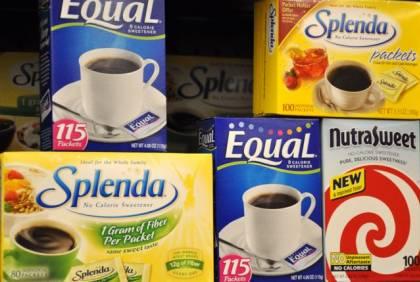Muscle Diet


Sweeteners - Do They Cause Fat Or Calcium Leaching
Q. I drink diet cola when I’m cutting up because it has no calories. It feels almost like a cheat because it tastes sweet, but I’m a bit concerned. I keep hearing that sweeteners are unsafe. Do they really promote fat gain and cause calcium leaching from bones?
A. I also consume sweeteners several times per day, and if there were any decent or compelling research to say they weren’t safe, believe me, I wouldn’t! Some people seem to be convinced, despite millions of people using them several times daily over the last several decades without any confirmed negative side effects,* that sweeteners are somehow unhealthy.
Let’s look at the facts:
Fat Gain
We know sugar increases hunger and adds extra calories (and few other nutrients) to our diets. And while it’s been suggested that artificial sweeteners can increase hunger too, the majority of studies don’t show the same effect. Is there any evidence that swapping sugar for sweeteners affects health or fat loss? Fortunately, the answer is “yes.” A very careful 10-week study showed that when two groups were given either typical foods and drinks that contained sugars or the equivalent foods containing sweeteners, the group that got the normal, sugar-containing foods ate more calories, gained weight, and gained body fat. Also, the sugar group experienced increased blood pressure (which went down in the sweetener group) along with decreased insulin function and higher blood triglycerides.
Sweetener Safety
So what about safety? Aspartame is made up of two amino acids (which are natural constituents of foods) and methanol. Methanol is a potentially toxic form of alcohol that can lead to blindness and death. However, what the armchair anti-aspartame “experts” don’t tell you (or don’t know) is that toxic substances are only toxic if you consume enough of them, and you’d have to eat a truckload of aspartame for this to become a concern! To put it in perspective, you’d have to drink two to four aspartame-sweetened protein shakes to equal the same amount of methanol in a single glass of tomato juice! I haven’t heard anyone warning people of the evils of tomato juice!
Additionally, there have been dozens of large-scale safety reviews on the various sweeteners—including yet another one that was done very recently by the European Food Safety Authority (EFSA). It, like every other major review, concluded that there is no health risk of using sweeteners even at much higher levels than virtually anyone would use. So unless you believe that there’s an international conspiracy among hundreds of scientists and regulators in several different countries, there’s no reason to believe that sweeteners are harmful.
Calcium Leaching
A study on calcium leaching showed that women (not men) who drank cola drinks daily had weaker bones than those who rarely drank them. Some evidence suggests that the carbonation or phosphorus in soda drinks may cause calcium loss or alter the ratio of phosphorus and calcium in the diet. Most soft drinks contain phosphoric acid, and studies have also shown that drinking more carbonated drinks results in a lower intake of milk and therefore calcium.
This study, however, doesn’t constitute a reason for anyone (women or men) to stop drinking a few soft drinks. First, the high cola drinkers in this study had similar phosphorus intakes to other subjects, but their ratio of calcium to phosphorus intake was lower, so the most obvious cause of their lower bone density is the lower calcium intake of the cola drinkers. Second, this lower bone density only occurred in high cola drinkers, not in people who drank other carbonated drinks with similar carbonation, caffeine, and phosphorus levels. Finally, most bodybuilders drink whey protein shakes, which are high in calcium. So that should solve the calcium-to-phosphorus ratio issue.
To read why Dr. Ann de Wees Allen opinion on this same topic, click HERE!
To read more by Mark Gilbert on Aspartame safety, click HERE.
*People with the rare genetic disease phenylketonurea cannot consume the amino acid phenylalanine, which makes up part of the aspartame molecule.

